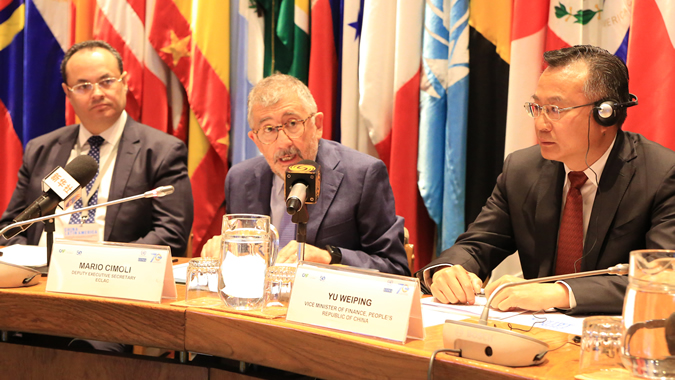China and Latin America and the Caribbean seek to deepen their economic and commercial cooperation, amid global uncertainty

Photo: ECLAC
The Second High-Level China-Latin America Investment and Cooperation Forum was held at ECLAC’s headquarters in Santiago, Chile.
With senior authorities from the government of China in attendance, along with representatives of international and regional organizations, development banks and the public and private sectors, experts, academics and diplomats, the Second High-Level China-Latin America Investment and Cooperation Forum took place today at the headquarters of the Economic Commission for Latin America and the Caribbean (ECLAC) in Santiago, Chile.
The gathering – organized jointly by ECLAC, CAF-Development Bank of Latin America, and the Ministry of Finance of the People’s Republic of China – seeks to serve as a platform to discuss best practices and new areas for cooperation between both sides, as well as to contribute in a timely way to the policymaking processes of many countries and regional development institutions.
The forum was inaugurated by Mario Cimoli, ECLAC’s Deputy Executive Secretary, on behalf of the organization’s Executive Secretary, Alicia Bárcena; Luis Carranza, Executive President of CAF; and Yu Weiping, China’s Vice Minister of Finance.
In his opening remarks, Mario Cimoli highlighted the growing cooperation between China and the region of Latin America and the Caribbean, which led to over $307 billion dollars in trade between them in 2018. Today the Asian nation is Latin America and the Caribbean’s second-largest trading partner behind the United States, representing 11% of regional exports and 18% of its imports in 2017. In fact, since 2015, China has ranked as South America’s top trading partner.
“There is still a lot of room to improve our cooperation. From the point of view of Latin America and the Caribbean, a fundamental challenge in its relationship to China is to diversify its shipments to that country, which continue to be highly concentrated in a few basic products. This second Forum is an important step along that path. It is crucial to address the importance of issues where China and Latin America find themselves in a changing global context, of business and investment opportunities in Latin America, of leveraging infrastructure financing for development, and promoting an industrial upgrade addressing climate change through new technologies, industry and models,” he said.
“In addition, this seminar is taking place at the best political time in our region, just days before the APEC Summit and the COP 25 which will be held here in Chile, when trade agreements are being discussed amid limited global growth, with investment and trade declining. For that reason, discussing these issues here is critical, ensuring that distinct development patterns are understood in the exchanges fostered by ECLAC and CAF, and in which the government of China plays an ever more important role,” Cimoli stressed.
Meanwhile, in his remarks, Luis Carranza referred to the important economic and social progress made by Latin America and the Caribbean in the recent past, but which has decelerated lately. “Despite the progress, enormous challenges yet remain, such as reducing infrastructure, inequality and productivity gaps. On this matter, China is a very important ally due to the complementarity of the development models of that country and of our region,” he said.
“It is essential to ECLAC and CAF to serve as useful instruments for our countries, strengthening relations between China and Latin America,” Carranza added.
In their respective presentations, both Cimoli and Carranza emphasized the relevance of the Belt and Road Initiative, led by China in recent years. They agreed that extending this initiative to Latin America and the Caribbean offers major opportunities for the region and can serve as a viable mechanism for achieving the goals of the 2030 Agenda for Sustainable Development.
Meanwhile, Vice Minister Yu Weiping noted that relations between both sides have been marked by a high degree of cooperation, with significant results, and he called for continuing to deepen this exchange in all aspects. “We are in an upward period for relations between China and Latin America. We have to keep deepening cooperation on the basis of the principle of reciprocal benefit and mutual respect to achieve the best development,” the Chinese official stated.
The Vice Minister also called for strengthening the shared strategy for cooperation, with initiatives like the Belt and Road, in which Latin American countries can take advantage of opportunities to develop their advantages, investing in the energy industry, civil works, agriculture, manufacturing, technology and informatics. “We can take advantage of these benefits to share our knowledge and thereby improve both parties’ development,” he indicated.
Furthermore, Yu Weiping called for rejecting protectionist policies and defending the multilateralism of the international system that is structured around the United Nations, to better promote freedom of trade and investment.





